- Home
- David Lubar
Sophomores and Other Oxymorons Page 21
Sophomores and Other Oxymorons Read online
Page 21
“Very funny.”
“Thanks.
“Seriously, that’s not sophomore material. Some of it isn’t even high school material. When Mrs. Gilroy first put it in her lesson plan, several decades ago, she was told she couldn’t cover it.”
“Seriously?”
“Yeah. Lesson plans were a lot more rigid back then. She fought for it. Took the battle to the school board. That’s how much she cares. Of all the things she teaches, as much as she loves the prose of Steinbeck and the poetry of Whitman, it’s the tools of the craft that are her true passion.”
“Yeah. I get that. But I still don’t understand why she’s jamming all of this down our throats,” I said.
“You’ll figure it out eventually,” Mr. Franka said.
“If I don’t die first.”
“I’m pretty sure you’d already be on board if anyone other than Mrs. Gilroy was involved,” he said.
“Maybe.”
“Well, you’ll get your chance to find out soon enough,” he said.
“What are you talking about?” I asked.
He gave me a cryptic smile. “You’ll see.”
THIRTY-FOUR
Are you sure you want to spend the day with the devil?” Mr. Fowler asked when he picked me up.
“As long as I don’t have to sign anything,” I said. I slipped into the passenger seat. “I like the devil’s wheels.” Any time Lee’s parents had driven us places, it was in an SUV. This was an Audi Spyder.
“The wages of sin are six or seven figures,” he said.
I don’t know a lot about clothing, but the suit he wore looked like it cost more than most people make in a week. Or maybe even a month. I had the feeling someone he knew by name had sewn it together, piece by piece, so it fit him exactly. We drove across the Delaware River into New Jersey. So did about ten thousand other people, who all wanted to get in front of us, or push us out of their way from behind. Mr. Fowler didn’t seem stressed at all by the traffic. On the other hand, he was driving a car that could eat most other cars for breakfast and spit their remains out its tailpipe while purring along at 120 miles an hour. I loved watching the expressions of the drivers we passed when they spotted me. Yeah, this kid rides in style.
We ended up at an office building in Piscataway. The directory in the lobby listed Geary, Fowler, and Goldsmith, Environmental Law on the fifth floor. I noticed there were no other companies on that floor.
When we stepped out of the elevator, it was pretty much the way they showed big law firms on TV. There was a receptionist right past the elevator, offices along the outside walls, and dozens of cubicles in the center of the space. Mr. Fowler had a large office in one of the corners, with a view of the Raritan River.
“Impressive,” I said.
“Impressions help land and maintain clients,” he said.
There was a family picture on his desk, taken when Lee was about five or six. It looked like she’d been born with brown hair. Mr. Fowler interrupted my contemplation.
“So, how much are you here to see what I do, and how much are you here because it got you out of school?” he asked.
“It’s seventy/thirty,” I said. “I am sort of interested.”
“That’s about what I would have guessed. As for the work, I’m sorry to say that much of it will seem pretty dull. Books, reading, research, that sort of stuff.”
“I like research,” I said. “And I spend a lot of time reading.”
“Don’t try to suck up to me, Scott,” he said.
“I wouldn’t dream of it. I really do like research.”
He pulled a chair over for me, then sat at his desk and started working. As he went through a stack of documents his secretary had brought in, he told me what he was working on.
“There’s a company near Lake Havasu City in Arizona. They make high-tech batteries. They employ three hundred people, doing everything from cleaning the floors to researching new technologies. This is all good, right?”
I hesitated, wondering whether it was a trick question. But finally, I said, “Right.”
“The current manufacturing process involves some heavy metals. Do you know what those are?”
I nodded. “Stuff like cadmium.”
“Right. And, as with any process, there are waste products. The company does a responsible job of disposing of these products. But a rare species of toad lives near the factory. Environmentalists fear that this properly disposed waste will harm this toad or reduce its habitat.”
“So what do they want to do?” I asked.
“They want to close the plant.”
He paused to let that sink in.
“Close it?”
“Close it,” Mr. Fowler said. He waved his hand to encompass the law firm around us. “We, on the other hand, do not want them to have to close the plant and put three hundred people out of work. That would be not just a personal tragedy for each employee, but also a great loss to the economy in the area. Many local businesses would suffer.”
“What’s the law say?” I asked.
“The law is slightly vague on some aspects of this, as is often the case. Laws are written with words. Those words are defined with other words, which are in turn defined by yet more words, some of which end up circling back to the initial words.”
“Sounds like modern poetry,” I said.
“It’s not quite that bad. But a lot depends on the interpretation. It’s my job to argue for an interpretation that favors my client. The government will attempt to argue otherwise. But I haven’t told you the most compelling part. Are you ready for the kicker?”
“Sure.”
“The company is investing a large portion of their research funds in developing a green battery—one that can be completely and inexpensively recycled without damaging the environment.”
“So it’s not a simple case of man against frog.”
“Toad.”
“Frog is funnier.”
“You might not enjoy law school.” He grabbed a notepad, wrote down some reptile and amphibian names, both common and scientific, then said, “Here. Do some research. See if there are news stories about any of these animals.”
I wasn’t sure if he was just giving me busywork, but I wasn’t lying when I said I liked research. And Mr. Fowler’s firm had totally kick-ass computers with access to all sorts of databases and news archives. He also had lunch delivered.
• • •
“Thanks. That was interesting.” I reached to unbuckle my seat belt. I didn’t know whether I wanted to be a lawyer, but I totally knew how I wanted to get to work.
“You’re welcome,” Mr. Fowler said. “Pay no attention to my suggestion that you avoid law school. I think the professors deserve a challenge once in a while.”
“I’ll give it some thought,” I said. “I really did have a good time.”
“And your research actually had some minimal value.”
“I’m glad.”
As I pushed open the door and started to step out, he said, “Scott?”
“Yes?”
“If you ever hurt her, I’ll destroy you.”
Talk about being caught off guard. I guess I should have said something noble, or assured him that I would never dream of hurting Lee. I’d throw myself in front of her to take a bullet, if necessary. As usual, all the good replies came to me later, when I was replaying the scene in my mind. At the moment, all I could come up with was, “That seems fair.”
I really don’t ever want to have a daughter.
• • •
We compared notes at lunch the next day.
“Your dad’s awesome,” Lee said.
“I know. So is yours. Sort of.”
“What are you talking about?” she asked.
“He’s trying to save three hundred jobs
at a company that wants to develop an environmentally friendly battery,” I said.
“Oh my god, you went over to the dark side,” Lee said.
“What?”
“You swallowed the poison. You chomped on the bait. You fell for his line. You probably don’t care at all about the toad. You’d make a perfect lawyer.”
“Well, it’s just a toad. I mean, I feel bad for it, but there are lots of toads.”
“Not like this one.”
“So?”
“What if there’s a chemical in that toad’s skin that can cure cancer?”
“You mean you’d want to save the toad so you can grind it up for medicine?”
“No. That’s just an example.”
“What about the three hundred people at the factory?”
“I feel bad for them,” Lee said.
“But not as bad as you feel for the toad?”
“It’s not that simple,” she said.
“Exactly!”
“Why are you shouting?”
“Why are you shouting?”
Lee looked at me. I looked at her.
We both started to laugh. Richard and Edith exchanged glances, and shook their heads.
“I’m glad I’m not an adult yet,” I said. “They have to deal with all sorts of stuff where you just can’t win. Even if you do win, you sort of lose.”
“Let’s stay young forever, Peter,” Lee said. “We’ll be pirates.”
“Very funny. I don’t want to stay young forever. I just want to remain here a little bit longer.”
• • •
Wesley picked me up after dinner. We were going to the movies. He was in one of those trucks they use to deliver big sheets of window glass.
“Wow, you really have to be careful driving that stuff around,” I said when I hopped into the passenger side.
“Tell me about it,” Wesley said. “Some of the roads are still icy from the last storm.”
• • •
Sunday, as I should have expected, Lee texted me at 2:00 A.M.
Is it my imagination, or did the last hour seem to fly right by?
I was too sleepy to think up a clever answer.
• • •
On Monday, as always after the clocks were changed, things felt a bit out of sync. But for a moment at the start of ninth period, when I walked into the classroom, it was not the clocks but the calendar that had been set back. Mr. Franka was standing up front. There was no sign of Mr. Kamber.
I turned to Lee. “If everyone gets three wishes, I’m down to two.”
Mr. Franka soon doused my hopes. “Mrs. Gilroy, who will be returning next month, asked me to make sure her favorite class still has a large amount of enthusiasm for the joy of words. So, just for today, I’ve swapped classes with Mr. Kamber.”
“Those poor freshmen,” Lee said.
I flashed her a smile and said, “Nwarries, smite!”
“Let’s generate some joy.” Mr. Franka picked up the chalk. “Black-and-white television, AM radio, mainframe computer, analogue recording.” He wrote each phrase on the board as he spoke. “What do all of these have in common?”
“They’re old?” Julia guessed.
Mr. Franka nodded. “True. But there’s more to it than that.” He wrote “yes” above the list of words, and “no” to the right of the list.
Under the “no,” he wrote “slide rule” and “buggy whip.”
“What’s a slide rule?” Kelly asked.
Mr. Franka gave her a quick explanation. I knew what they were. My grandfather had showed me one, years ago. It was kind of cool how you could do math with it, even though it wasn’t real accurate for big numbers.
Mr. Franka tossed the chalk from hand to hand. “Any more guesses?”
“They’re all some sort of technology,” Kelly said.
“True,” Mr. Franka said. “So let’s add a few more examples.” Under “yes,” he wrote “wild salmon” and “snail mail.”
I thought about my letters from Mouth. “Snail mail” used to just be called “mail.” I scanned the rest of the phrases on the left side of the list, to see if they fell into that same category. Yeah, they fit. At one time, there was just radio, and there were just computers. All radio was AM, and all computers were mainframes.
“Got it.” I raised my hand.
“Yes, Scott,” Mr. Franka said.
“All the words on the left, they used to not need to be modified. Right?”
“Right,” Mr. Franka said. “The new coinages became necessary because of changes. At one time, there was just television. When color TV came along, it became necessary to refer to the old televisions as black-and-white TVs.”
He paused so we could absorb this, then added, “Words of this sort are called retronyms.”
“Cool,” I said. And that word made me think of a retronym. Hot tea. I think all tea used to be served hot. There was just tea. But then there was iced tea.
And so I had a brief classroom reunion with my favorite English teacher.
Zenger Zinger for March 10
Last week’s answer: “Let’s touch the bare wires together,” John Peter said shortly.
This week’s puzzle: “A buffalo and half a score of lampreys,” John Peter said _________.
THIRTY-FIVE
I’d decided to go with a green shirt, but regular jeans for St. Patrick’s Day. Going all green seemed a bit excessive. Especially when you’re short, and don’t want to offer anyone openings for leprechaun jokes.
I guess Jeremy hadn’t given it much thought, because he’d made that mistake.
“You’re going to have an interesting day,” I said.
“Interesting has become my least favorite word,” he said.
When I got to school, I was surprised to see that Lee had dyed her hair green.
“You went with the obvious,” I said.
“It seemed the subtlest way to go,” she said.
It wasn’t subtle in the locker room. Besides a sea of green shirts and pants, there was an ocean of green underwear.
“This borders on the excessive,” Richard said. He’d settled for a striped shirt that was green and blue.
“This is nothing.” I turned toward Kyle. “Remember how crazy Patrick would get? One time—” I cut myself off. I’d forgotten we weren’t talking.
I guess Kyle sort of forgot, too. “Yeah. And he was only half Irish.”
I turned my attention back to Richard, and recounted some of Patrick’s more enthusiastic wearings of the green.
As we left the locker room, Kyle said, “You ever hear from him?”
“Once or twice. But not for a while.”
“That’s life,” Kyle said. “People go away.”
“I still miss him,” I said.
Kyle nodded. It was a tiny nod, but a real one.
After a long winter of indoor gym, we’d finally started going outside again. That was good for Mr. Cravutto, since separate boys’ and girls’ gyms meant he was kept away from his true love. And it was good for the class, because it meant we were back to self-rule. Which, as anyone could tell you, was not called metonymy.
According to school rumors, several independent sightings, and their current body language as they chatted, the two gym teachers were actively dating. That was good. I was happy for Mr. Cravutto.
On the way out of the locker room, I poked my head in his office and asked, “Need any more help with poems?”
“No. That one seemed to do the trick. No point taking a chance that the next one will mess things up.” He shook his head. “Women are hard to understand.”
“But you finally asked her out?”
“Yup. Finally.”
Maybe he’d be a source of advice. I’d been seeking sophisticated wisdom fro
m various corners. Perhaps what I needed was primal instinct. I risked a question. “What took you so long?”
“Women are scary,” he said. “But loneliness is scarier.”
“That makes sense.”
“What about you, Hudson. Got a steady gal?”
“I’m working on it,” I said.
“Good for you.”
The bell rang. Damn. “Can I have a pass?”
“You won’t need it.”
Zenger Zinger for March 17
Last week’s answer: “A buffalo and half a score of lampreys,” John Peter said bicentennially.
This week’s puzzle: “There’s a big hint on the pirate treasure map,” John Peter said _________.
March 17
Sean, St. Patrick’s Day is two days after the Ides of March. That got me wondering whether there was a word meaning “the day after tomorrow.” I looked it up. There is. Overmorrow. That’s sort of cool, even if it’s not used anymore. I wonder whether two days ago would be overyester? Probably not.
The subspecies Homo Zengerus faculatus has two dominant lines, instructorus and administratus. Interactions among individuals or groups of these lines can be cooperative or aggressively competitive. In either case, their actions often have a strong impact on Homo Zengerus studentes.
When I walked into biology on Monday, there was something other than a splayed cat occupying center stage. The principal was arguing with Ms. Denton.
“No,” she said, at a fairly high volume.
Normally, I wouldn’t pay attention to anything a teacher and the principal were discussing. I’d walked past dozens of those conversations, and knew they held no interest for me. But this was different. That one word—“no”—seemed to carry a lot of weight, as if it conveyed sentences, or even paragraphs.
I almost tripped when I reached my seat, because I was trying hard to walk like someone who wasn’t eavesdropping.
“You have to,” the principal said. “The board voted on it. Those new members came with an agenda.”
“No,” she said again. “I won’t. Absolutely not.”
“It’s one module. It won’t take any work on your part. They sent the material. You can cover it in fifteen minutes. Fit it in next week sometime.”

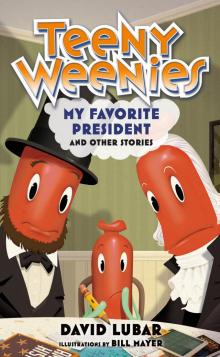 Teeny Weenies: My Favorite President
Teeny Weenies: My Favorite President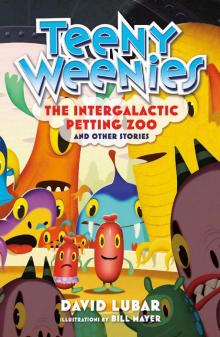 Teeny Weenies: The Intergalactic Petting Zoo
Teeny Weenies: The Intergalactic Petting Zoo Teeny Weenies: The Eighth Octopus
Teeny Weenies: The Eighth Octopus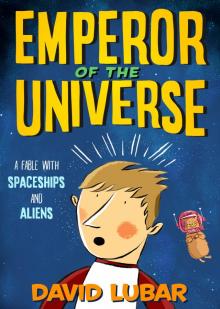 Emperor of the Universe
Emperor of the Universe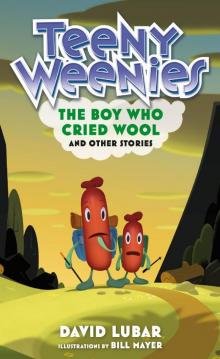 Teeny Weenies: The Boy Who Cried Wool
Teeny Weenies: The Boy Who Cried Wool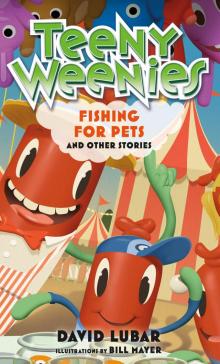 Teeny Weenies: Fishing for Pets
Teeny Weenies: Fishing for Pets Teeny Weenies: Freestyle Frenzy
Teeny Weenies: Freestyle Frenzy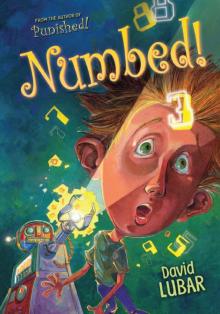 Numbed!
Numbed! Punished!
Punished!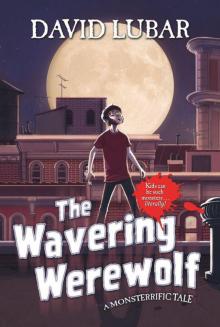 The Wavering Werewolf: A Monsterrific Tale (Monsterrific Tales)
The Wavering Werewolf: A Monsterrific Tale (Monsterrific Tales) Dog Days
Dog Days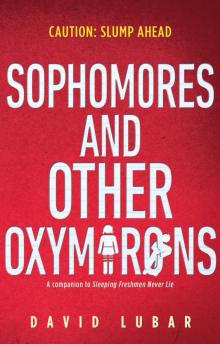 Sophomores and Other Oxymorons
Sophomores and Other Oxymorons The Psychozone
The Psychozone My Rotten Life
My Rotten Life Invasion of the Road Weenies
Invasion of the Road Weenies In the Land of the Lawn Weenies
In the Land of the Lawn Weenies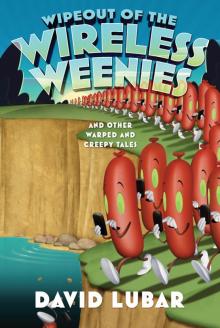 Wipeout of the Wireless Weenies
Wipeout of the Wireless Weenies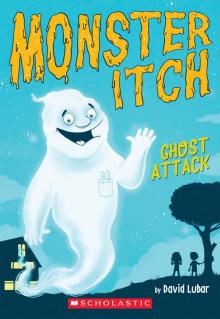 Ghost Attack
Ghost Attack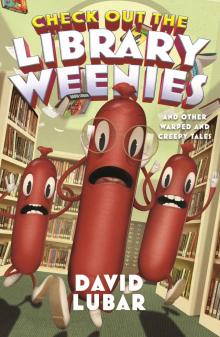 Check Out the Library Weenies
Check Out the Library Weenies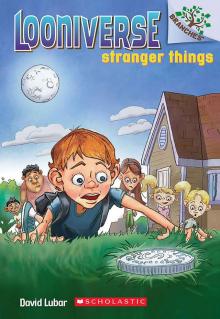 Looniverse #1: Stranger Things (A Branches Book)
Looniverse #1: Stranger Things (A Branches Book)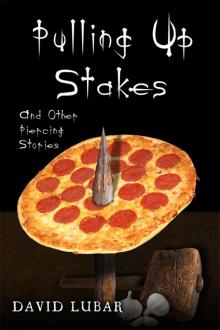 Pulling up Stakes and Other Piercing Stories
Pulling up Stakes and Other Piercing Stories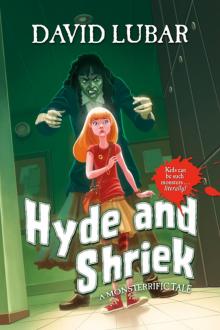 Hyde and Shriek
Hyde and Shriek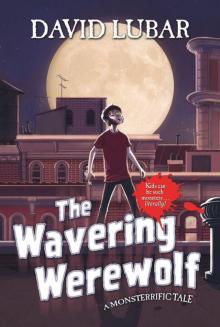 The Wavering Werewolf
The Wavering Werewolf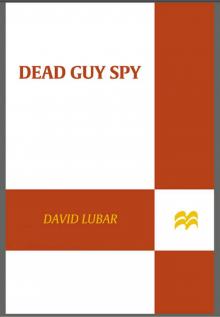 Dead Guy Spy
Dead Guy Spy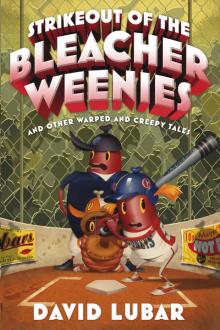 Strikeout of the Bleacher Weenies
Strikeout of the Bleacher Weenies The Big Stink
The Big Stink The Battle of the Red Hot Pepper Weenies
The Battle of the Red Hot Pepper Weenies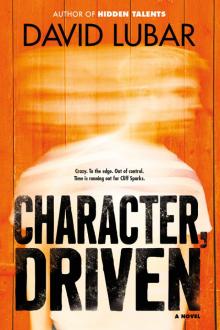 Character, Driven
Character, Driven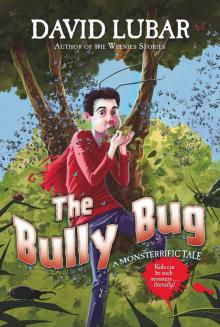 The Bully Bug
The Bully Bug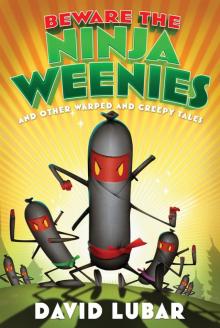 Beware the Ninja Weenies
Beware the Ninja Weenies Extremities: Stories of Death, Murder, and Revenge
Extremities: Stories of Death, Murder, and Revenge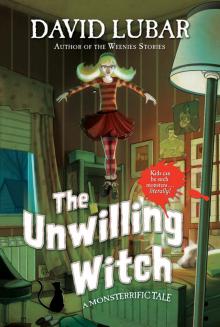 The Unwilling Witch
The Unwilling Witch Goop Soup
Goop Soup Lay-ups and Long Shots
Lay-ups and Long Shots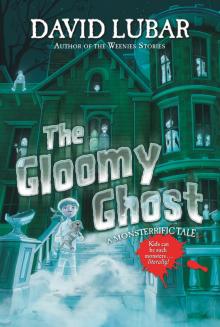 The Gloomy Ghost
The Gloomy Ghost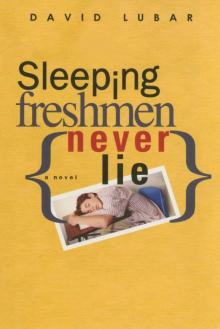 Sleeping Freshmen Never Lie
Sleeping Freshmen Never Lie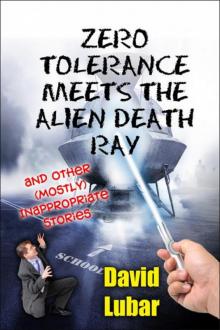 Zero Tolerance Meets the Alien Death Ray and Other (Mostly) Inappropriate Stories
Zero Tolerance Meets the Alien Death Ray and Other (Mostly) Inappropriate Stories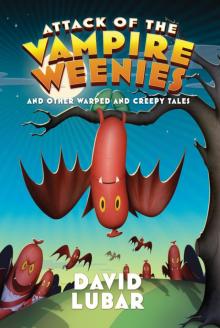 Attack of the Vampire Weenies
Attack of the Vampire Weenies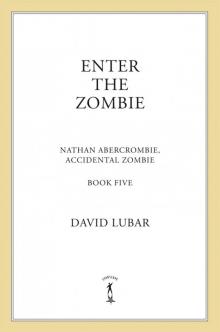 Enter the Zombie
Enter the Zombie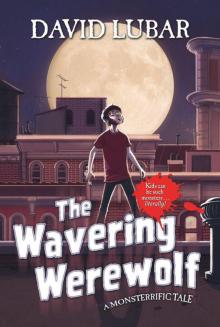 The Wavering Werewolf_A Monsterrific Tale
The Wavering Werewolf_A Monsterrific Tale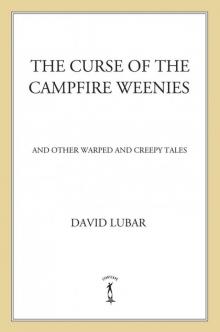 The Curse of the Campfire Weenies
The Curse of the Campfire Weenies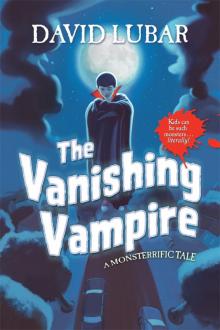 The Vanishing Vampire
The Vanishing Vampire